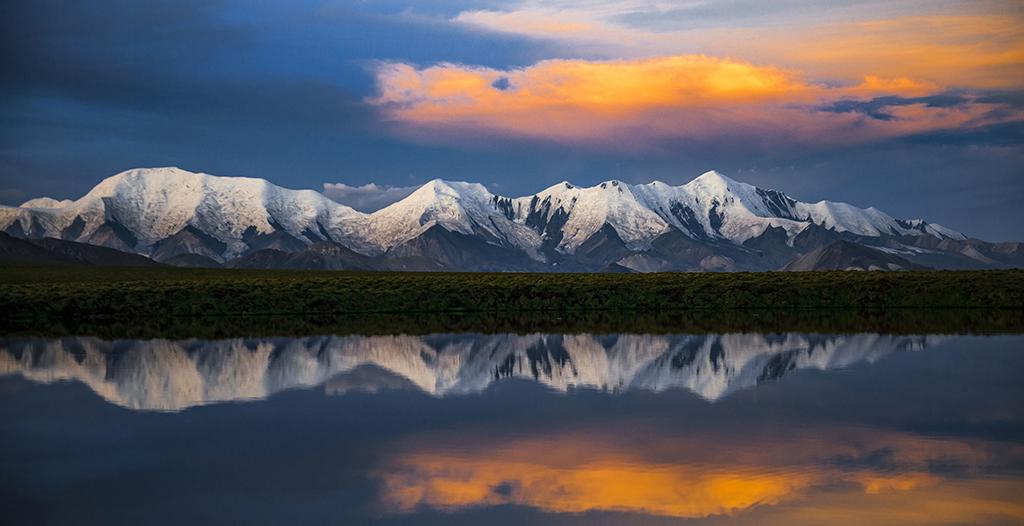Flourishing flora and fauna a great example of Qinghai's ecological efforts
Located on the Qinghai-Tibet Plateau, which is known as the "Third Pole of the Earth", Northwest China's Qinghai province has been a key barrier for ecological security in Asia and the wider world. Through 10 years of efforts, the province has become a model for building up ecological civilization and harmonious coexistence between humans and nature.
Qinghai province is the fourth-largest province in China in terms of area and is home to the headwaters of the Yangtze, Yellow and Lancang rivers. It is also known for its rich water, solar and wind power resources. Blue skies, green mountains and clear waters are among the signature landscapes there.

Qinghai has become a model for building up ecological civilization and harmonious coexistence between humans and nature. [Photo/chinadaily.com.cn]
Ecological barrier
The Three-River-Source National Park, located in Qinghai, was among the first batch of national parks in China. It has a unique ecosystem and a concentration of biodiversity in high-altitude regions.
Through the construction of the national park, the Three-River-Source region has achieved fruitful results in ecological protection. Wetland area has increased from 39,000 square kilometers to nearly 50,000. Once-disappeared lakes and rivers have reappeared at the source of the three rivers.
Qinghai Lake is the largest inland and largest saline lake in China. With the application of ecological protection measures, the water level of Qinghai Lake has risen continuously since 2005. Data from 2021 show that the water area of Qinghai Lake has increased by nearly 220 sq km over the past decade.
The Qinghai-Tibet Plateau Ecological Protection Law came into force on Sept 1, as part of efforts to regulate ecological protection on the Qinghai-Tibet Plateau at national level.
Clean energy
Qinghai also has a large amount of desert and wasteland, making the prospect of developing clean energy promising. By utilizing abundant solar energy, hydropower and wind energy, Qinghai is constructing photovoltaic power generation parks and hybrid power stations.
As of the end of 2022, the province's installed capacity for power generation reached 44.68 million kilowatts, of which 40.75 million kW is from clean energy, or 91.2 percent. And 28.14 million kW is from new energy, or 62.9 percent.
Through ultrahigh voltage transmission channels, Qinghai's green electricity is powering Beijing Daxing International Airport and will serve the upcoming Hangzhou Asian Games. The cost of producing clean energy in Qinghai is lower than that of thermal power.
A manager from the Hainan Tibetan autonomous prefecture's ecological photovoltaic generation park said that by relying on geographical advantages and abundant sunlight, Qinghai is combining photovoltaic ecological parks with the husbandry industry. This model not only realizes low-carbon development of the photovoltaic energy industry but promotes the upgrading of animal husbandry.
Protecting biodiversity
Data from multiple wildlife observation points in Qinghai show that populations of endangered species such as snow leopards, Tibetan antelopes, Tibetan gazelles and black-necked cranes have been increasing year-on-year.
In particular, the elusive snow leopard, a rare species that was once unable to be tracked, has now been monitored by more than 1,200 individuals in the past decade. Qinghai has become one of the regions in China with the highest number of bird species. More than 220 species of more than 10 million migratory birds pass through Qinghai Lake annually.
Populations of Przewalski's gazelle, which can only be found in the wild in China, have been restored to more than 3,400, from about 300, according to a staff member from a gazelle protection station in Qinghai Lake's south bank.
In Qinghai Lake, the number of habitat areas for the endangered gazelles has increased from the initial seven to 15 thanks to protection measures such as a national wildlife rescue project, community co-construction and co-management campaigns, reducing the height of fences and setting up rescue points.
"We deeply understand that the Three-River-Source region and the 'water tower' belong not only to Qinghai but also to the nation and the world. Qinghai province is striving to build up ecological security barriers here, promote green development, become a model province for national parks, and build a community of a shared future for humans and nature. We will achieve more robust and higher-level ecological civilization construction and be the guardian of the 'Third Pole'," said Chen Gang, Party secretary of Qinghai, at an event promoting Qinghai's ecological civilization development in Xining in September.
The event invited about 150 foreign representatives from nearly 30 countries to Qinghai to investigate the achievements of Qinghai in building an ecological civilization and promoting harmony between humanity and nature.
